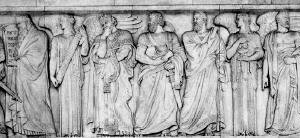One of the courses I’m taking in this, my final semester at Georgetown Law, is Church-State Law, and it’s co-taught by Mark Chopko and Rabbi David Saperstein. Chopko is the former general counsel for the USCCB, while Rabbi Saperstein is the Director of the Religious Action Center of Reform Judaism, and has a very impressive bio. What the bio doesn’t tell you is that he’s got a good sense of humor, too. A couple of the things he’s said in the last couple weeks struck me as funny enough to remember.
1. Since he’s fluent in Hebrew, he was asked in the course of a trial to read what is inscibed on Moses’ tablet in the frieze below. This picture is of the frieze inside the Supreme Court, and if memory serves, it came up in a case where a court wanted to put up the Ten Commandments. Moses, below, is fifth from the left (feel free to click):
 The party which wanted to put up the Ten Commandments argued that of course it was legal, since the Supreme Court has the same thing. The other side argued that there was a big difference: Moses is on one of two friezes of historic law-givers along with Justinian, Mohammed, Hammurabi, Blackstone, John Marshall, and Napoleon, and further, Moses is only holding the second tablet, which prohibit murder, adultery, theft, false witness, and coveting (there’s some controversy with the numbering, but those are the ones which the artist depicted as Commandments VI-X). Or, at least, that’s what everyone assumed.
The party which wanted to put up the Ten Commandments argued that of course it was legal, since the Supreme Court has the same thing. The other side argued that there was a big difference: Moses is on one of two friezes of historic law-givers along with Justinian, Mohammed, Hammurabi, Blackstone, John Marshall, and Napoleon, and further, Moses is only holding the second tablet, which prohibit murder, adultery, theft, false witness, and coveting (there’s some controversy with the numbering, but those are the ones which the artist depicted as Commandments VI-X). Or, at least, that’s what everyone assumed.
In fact, when Rabbi Saperstein examined the picture up close, he discovered that either through some devious artistic humor or an amusing accident, Moses (who is in front of the tablet) is actually covering up the beginning of the commandments with his body. So instead of saying, “thou shalt not murder,” “thou shalt not commit steal,” and so on, it’s just Moses holding a tablet which command: “Murder,” “Steal,” and so forth. Apparently, upon discovering this, he began laughing in court, and had to explain why.
2. The second amusing story was a joke he told today in class. We’d been talking about what happens when a church splits. It’s a really troubling issue legally (particularly if the church isn’t part of a larger denomination with rules on how to handle these situations), because of the First Amendment, but there are times when Christians ignore 1 Corinthians 6:1-9 and take property disputes to court. Professor Chopko is explaining how complicated this all can get, when Professor Saperstein injects:
Lest you think that this problem is limited to Christianity, there’s an old Jewish joke that a man gets stranded on a desert island for twenty years. When he’s finally rescued, they discover that he’s built two synagogues. “Why would one man need two synagogues?” they asked him. He points to the first one and says, “That’s the one I go to,” and then (voice dripping with disdain), “and that’s the one I don’t.”
